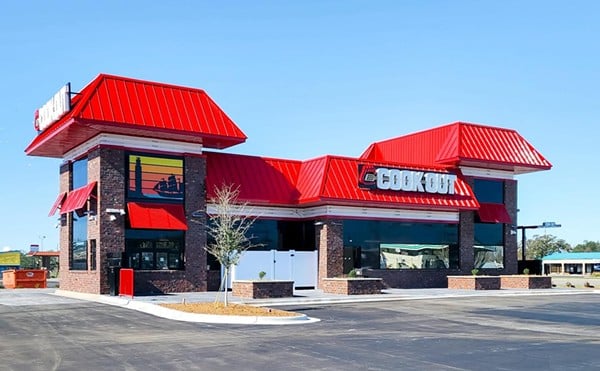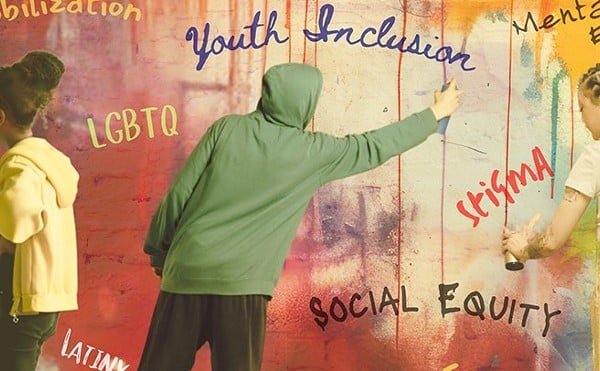Faun Fables w/ Lucky Pineapple, Virgin Flame
Sunday, Aug. 17
Sixth & Oak Collective
Sixth & Oak streets
$10; 8 p.m.
Half a decade ago, Dawn McCarthy bid farewell to New York City’s hustle and began Faun Fables. A fan of physical theater and experimental music, her project, which includes longtime collaborator and Sleepytime Gorilla Museum member Nils Frykdahl, is touring its Drag City short, A Table Forgotten. They break for showcasing Sunday evening.

LEO: A Table Forgotten will be one of many records that focus on “age-old practices of tending a home and its immediate impact upon our daily lives,” according to the press bio. Why did you want to examine these practices?
Dawn McCarthy: Well, it’s a subject that’s been developing over the years. The reason I say it’s a series is, the way it’s been unfolding has been in these different kind of stages. My first exploration was with the Idyllwild Arts Academy students (in southeastern California). Last winter, I started working on a show with them, and it was somewhat collaborative, and they definitely inspired some of the lyrics. The show we started putting together was based on the improv I did with them, but we kind of worked in with this theme of roots, heritage, family roots. They helped form that particular show that we did.
Three of the four songs (“Picture,” “With Words & Cake,” “A Table Forgotten”) were in that show, but that particular show was very much about working with those particular students. I wanted to put this EP out right now. It would be nice to put out something that was short, so I know the full-length record is going to have some of those other songs. I’d like to open up that theater show again. I could see myself writing about it on and off. It’s a bit of an open series.
LEO: Does the full-length have a name?
DM: Not yet. I think it will have the word table in it somehow, though.
LEO: You and Nils are known for having a theatrical approach to your live shows, and you’ve trained with the experimental Polish theater group Gardzienice. What effect did this have on the way you write music and perform it?
DM: When I saw Gardzienice, the reason I was so drawn to them was because I felt it was something I was related to, something I could understand, similar to where I came from already, and just some of the instinctive approaches I felt toward performing. And in fact, people would tell me, “Oh, these are theatrical shows.” To me, I wasn’t necessarily thinking they were theatrical, even when I felt I was just singing songs.
Once I did the training with Gardzienice, it inspired me, knowing the potential of physical energy as a performer. Sometimes you have to experience things that push the roof off and push down the walls, see that you can go there and see where that place is. I had to release myself to this group physicality. Some of the stuff with Gardzienice is quite wild. It’s almost like heavy rock energy, stomping and breathing and getting into this real guttural stuff. Some of the most interesting vocal training comes from theater. That was one of the biggest things that inspired me as well: this idea of the whole body being a resonant chamber for the voice. I find it really emancipating, because people get this concept of what this voice is supposed to sound like, and it can really inhibit them to make any sounds. The downside of theatrical singing would be the idea that it’s representational instead of presentational. It can really be unhinging yourself and letting loose, but it doesn’t mean that it has to divorce you from some deep emotional connection to it.
LEO: How would you say your collaboration with Nils has grown over the years?
DM: Working with him, it’s so easy for me. I think we’ve definitely influenced each other’s writing. When he met me, he wasn’t writing any songs that he could play and sing himself, so his parts would always be one part of a tapestry. He really wanted to write from an emotional place as well. He has a way of creating such an amazing journey of movement, no matter how abstract and complicated the music is. With me, often I get content seeing the instrumentation as an assistance to the voice and place and atmosphere of the song. I can get very vocal-centric, and he’s helped me to remember to develop other angles, other parts that make up music.
LEO: You have said in the past that you felt like people, in general, have lost touch with nature’s cycles and rhythms. With the current examination of the negative effects humans have on nature, do you think we’re trying to reconnect with it?
DM: I’m noticing that people are convinced that it’s happening, that how we live as a species is affecting things. I’m not sure how much, on a larger scale, it’s affecting how people are living right now.
I’m noticing just with the price of gasoline, the death of the oil age, I’ve heard about people moving from the suburbs back into town. I’m noticing amongst friends I have that people are talking much more about carpooling. I’m noticing more bicycling; Nils pretty much bikes wherever he can. So I’d have to say I’m seeing little things. I kind of have the same question you have. It’s a hard thing though, too, like, we’re talking about cycles and rhythms and paces of life. It’s hard to deny, on the other hand, all the increasing gadgetry, and that stuff we’re being bombarded with. We’re definitely living in an interesting time. I see people more aware of the issues, but I don’t see them being less fragmented or hurried in the pace they live, and the mode they’re living in.





